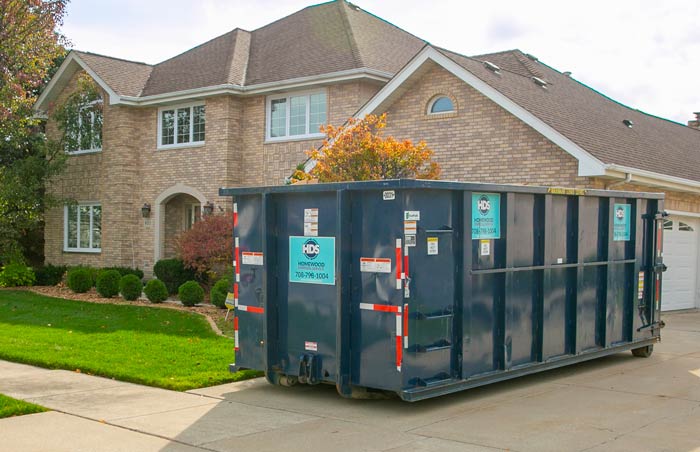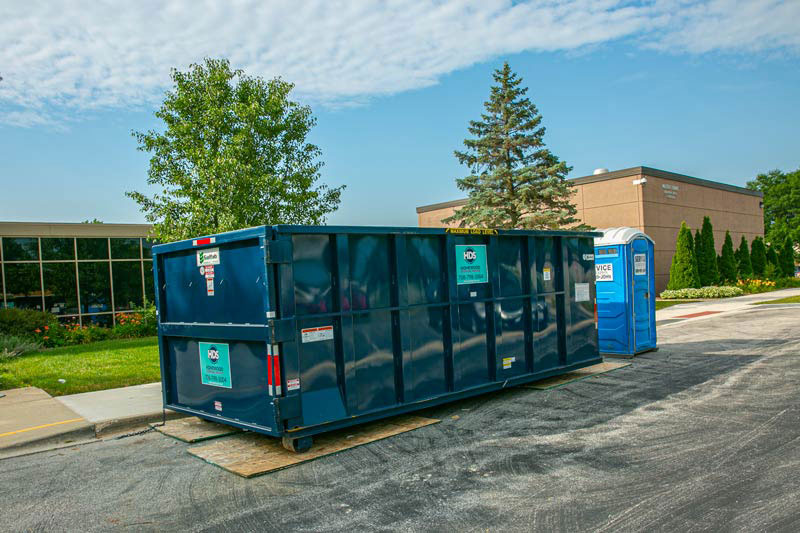Choosing the right dumpster for your project is crucial to ensure an efficient, hassle-free waste management process. Whether you're handling a home renovation, a large construction site, or a seasonal clean-up, selecting the right dumpster can make a world of difference in your project’s cleanliness, organization, and cost-effectiveness. With various dumpster types available, each suited to different needs, knowing which one is right for your project will not only streamline waste disposal but also prevent unnecessary costs or delays.
Types of Dumpster Rental
Choosing the right types of dumpster is crucial for efficient waste management. Different dumpsters cater to various projects, from home cleanouts to construction debris. With a range of sizes and options available, dumpster rental services help ensure you select the best container for your specific needs, making your cleanup process smooth and cost-effective.
Roll-Off Dumpsters
Roll-off dumpsters are one of the most common and versatile types of dumpsters. Typically used for large-scale projects such as home renovations, construction sites, or large cleanups, roll-off dumpsters are designed to be delivered by a truck and rolled off the back. These dumpsters come in various sizes, from 10-yard to 40-yard, and are ideal for handling large amounts of waste, including debris, construction materials, and household junk. The open top design makes it easy to toss in waste, and they are equipped with wheels for easy mobility on the site. Roll-off dumpsters are especially useful for short-term projects as they are easily accessible and can be quickly delivered and picked up.
Front Load Dumpsters
Front load dumpsters are commonly used in commercial settings for businesses that require regular waste disposal. These dumpsters are typically smaller in size and are lifted by the front of a truck to be emptied. Unlike roll-off dumpsters, front-load dumpsters are designed to remain stationary and are picked up on a scheduled basis. These dumpsters are perfect for businesses like restaurants, retail stores, or offices that generate moderate amounts of waste. They are available in sizes ranging from 2 to 8 yards, depending on the needs of the business. Front-load dumpsters are a great option for businesses looking for a reliable, consistent waste removal solution.
Compactors Dumpster
Compactors are specialized waste containers that reduce the volume of waste by compressing it. These dumpsters are ideal for businesses or industries that generate large amounts of waste, such as manufacturing facilities or warehouses. A compactor works by using a mechanical system to compact the waste, allowing more material to fit into the same space. This makes it an ideal solution for businesses that want to save on the number of dumpster pickups needed, reducing overall disposal costs. While compactors are typically used in commercial and industrial applications, they can be an excellent option for large projects that produce significant waste.
Yard Waste Dumpsters
Yard waste dumpsters are specially designed for handling organic materials from landscaping or outdoor cleanup projects. These dumpsters are typically used for the disposal of grass clippings, branches, leaves, and other organic debris. Yard waste dumpsters are typically available in smaller sizes, as the waste tends to be lighter and bulkier compared to other types of waste. They provide an eco-friendly way to dispose of yard waste, and many companies offer special disposal services for these types of materials, such as composting. Yard waste dumpsters are ideal for seasonal cleanups or home gardening projects.

Selecting the Right Dumpster for Your Project
Selecting the right dumpster size is crucial for efficient waste removal. A size that’s too small can lead to multiple trips, while a large dumpster means paying for unused space. With options ranging from 10-yard to 40-yard dumpsters, choosing the right size based on your project’s scope helps avoid unnecessary costs and ensures smooth cleanup.
Project Size and Scope
The size and scope of your project will heavily influence the dumpster size you need. For smaller projects, such as a garage cleanout or minor home renovations, a smaller dumpster (e.g., 10-15 yard) may suffice. However, larger projects like full home remodels or construction sites might require a 30-yard or 40-yard dumpster to accommodate the increased volume of waste. The key is to estimate the amount of waste your project will generate and choose a dumpster size that aligns with that estimate. It’s always better to have a slightly larger dumpster
than to risk running out of space and needing a second pickup.
Waste Type and Disposal Needs
Different types of waste require different handling. For example, general construction debris, household junk, and yard waste all have unique disposal requirements. When choosing your dumpster, make sure it can accommodate the specific type of waste your project will generate. Some dumpsters are designed to handle heavy debris, while others are better suited for organic materials or light household junk. Understanding the waste type will help ensure that you choose the right dumpster to meet your project’s needs and avoid unnecessary complications.
Budget Considerations
Budget is always a key factor when renting a dumpster. The cost can vary based on factors such as dumpster size, type, rental duration, and the type of waste being disposed of. Roll-off dumpsters tend to be more expensive than front-load dumpsters due to their larger size and the need for delivery and pickup. Additionally, some rental companies charge extra for specific waste types, like hazardous materials. It’s important to get an accurate estimate of costs and factor in any additional fees for permits or specialized waste disposal.

Saving Money with the Right Dumpster
Renting the right dumpster not only simplifies the waste management process, but it also results in significant cost savings. If you rent a dumpster that fits the size of your project, you're more likely to get the most out of your rental fee. Overestimating the size of the dumpster is often a smart move, especially for large projects like home renovations or large cleanouts, as it avoids the inconvenience and extra costs of needing a second dumpster or multiple pickups. In contrast, underestimating your needs can lead to delays and additional costs that could have been avoided. A well-chosen dumpster makes it easy to remove waste quickly without the need for constant trips to the landfill, allowing you to focus on completing your project without interruption.
Convenience and Time-Saving Benefits
Beyond cost-effectiveness, renting the right dumpster also offers a level of convenience that makes the entire process easier. For larger-scale projects, having a dumpster on-site allows for quick waste disposal without needing to take time out of your schedule to transport waste to a dump. This not only saves you time but also keeps the work area clean, organized, and safe. Without a proper waste management system in place, large amounts of debris can pile up, creating hazards for workers or disrupting your project. With a dumpster on-site, however, waste is disposed of immediately, ensuring that your project proceeds smoothly and on schedule.
Avoiding Common Dumpster Rental Mistakes
Avoiding common mistakes can help ensure that your dumpster rental experience goes smoothly. One of the most frequent mistakes people make is underestimating the amount of waste they will generate. This often leads to running out of space in the middle of the project, which can be frustrating and costly. It's always better to overestimate your waste needs, as it saves you from needing to order additional dumpsters halfway through the project. Another mistake to avoid is selecting the wrong dumpster type or size for your specific needs. A dumpster that's too small may result in overloading and additional charges, while one that's too large may come with unnecessary extra costs. By carefully considering your project size and the waste you’ll be generating, you can choose the ideal dumpster that will prevent these issues.
Contact Us
Have questions about your dumpster rental or need help choosing the right size for your project? We’re here to help! Reach out to our friendly team, and we’ll guide you through every step—fast, easy, and hassle-free.
Phone: 614 350-5475
Email: [email protected]
Address: https://dumpsterrentaldurhamnc.info/
Conclusion
In conclusion, selecting the right dumpster for your project is critical to its success. By considering factors like project size, waste type, and rental duration, you can make a well-informed decision that ensures efficient waste management and cost savings. Additionally, choosing the right dumpster allows for a cleaner, safer, and more organized work environment, making the entire process easier and more effective. Renting a dumpster is an investment in the smooth progression of your project, ensuring that waste is handled promptly and professionally. With the right preparation, you can avoid common mistakes and enjoy the benefits of a streamlined, hassle-free cleanup process.
Frequently Asked Questions
What size dumpster should I rent for my project?
The size of the dumpster you need depends on the amount and type of waste you need to dispose of. For small projects, a 10-15 yard dumpster may suffice, while larger projects like home renovations may require a 20-30 yard dumpster.
Can I rent a dumpster for a one-day project?
Yes, most dumpster rental companies offer flexible rental periods. Whether you need a dumpster for one day or several weeks, you can choose a rental plan that suits the length of your project.
Do I need a permit to place a dumpster on the street?
In some areas, you may need a permit to place a dumpster on public property, such as the street. It's important to check with your local authorities and the rental company to determine if a permit is required.
What items can I not throw away in a dumpster?
Hazardous materials like paint, chemicals, batteries, and electronics are typically not allowed in standard dumpsters. It's essential to check with the rental company for a list of prohibited items and find alternatives for disposal.




.jpg)
Comments